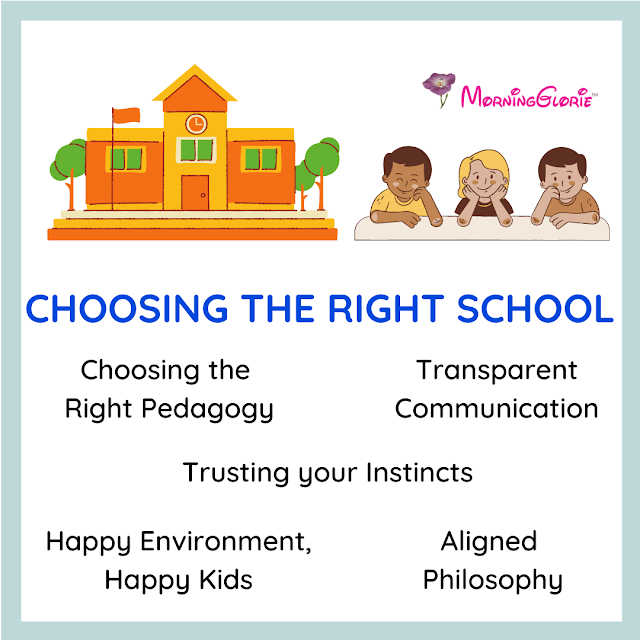A few months ago, we had done a blogpost about Conventional vs Experiential Learning for Toddlers. We had talked about the difference between conventional learning and experiential learning, and how there could be a more balanced approach which blended the two modes of learning.
Today, we take that discussion one step ahead, and share our experiences when it comes to parents choosing a school for their child. This could be at any level - a parent choosing their child's first preschool, or transitioning from preschool to formal schooling. 10 years of being has taught us a lot, as the parent body at Morning Glorie's preschool in Gurgaon applied to formal schools during the admissions season, well for that matter when they came to Morning Glorie too. Some common trends could be observed, and now that we offer homeschooling through our online preschool in India, we find that they are commonly observed everywhere.
Rushing to Apply for the Big Names
Whichever city you may come across parents, the rush to apply can be observed as soon as the big names open up their admissions. The basis is rankings, which do matter. However, it is as important to understand the school, what it offers, and whether that gels with what you and especially your child's needs. Many a times, a smaller school may offer something much better, which you miss out on when looking only for the big names.
Applying to Too Many Schools
There is a tendency to apply to many schools. This may be important for some cities where there is a limited set of good schools, but for the most part, this could turn out to be counterproductive for a number of reasons.
1. You spend a bomb on the admissions procedures.
2. You apply to a variety of schools, many of which will differ in their pedagogical approach as well as philosophy. If you end up clearing the process of two different kinds of schools, you may not have given much thought to which school you actually want.
As our experience at our preschool in Gurgaon, having witnessed the admissions seasons over the past 10 years, tells us, apply for 2 or 3 of the big names you want to target, and choose one backup school you like, where you can get walk-in admission. This approach certainly works well in Gurgaon, without taking too much stress over admissions.
Focusing on Physical Rather Than Human Infrastructure
Access to good infrastructure counts, but what matters more in the long run is access to a good set of teachers, especially in the formative years of learning. While doing your research, it is important to get feedback on this aspect.
Most importantly though
Make Sure the School's Philosophy Aligns with Yours
Choosing the Right Pedagogy
Let's talk about pedagogy first. As we spoke in our earlier post, learning methodologies broadly follow three approaches -
1. Experiential
2. Conventional
3. Balanced Approach
Each child is different, and requires a particular type of environment to thrive as well as be challenged in the right spirit. As a parent, you may also have a certain set of expectations from the school. Therefore, while applying to a school, it is important to assess whether your expectations align with the school's pedagogical approach. If the "best" school in your city follows an experiential approach, but you expect a structured and clean environment for your child with focus on academic concepts, then your philosophy is not aligned with the school's. You do not have to apply to this school just because everyone else is.
Similarly, if your friend likes a school because it focuses on academics, but you want a school which offers better sports infrastructure, then you do not need to apply to the same schools.
Trust Your Instincts
Understand what you want, then make a list of the schools which offer that. Meet the people at the school, and trust your instincts to guide you. This holds true for preschools as well as formal schools. When transitioning to formal schools, your preschool will also help you with information, as they have seen the process over many years, and have feedback from their alumni network as well.
When choosing a preschool, the teachers will matter most, because the children are small and need a nurturing environment.
Transparency Matters
You are entrusting your child's future into a school's hands. Therefore, transparency in communication matters, especially first up. Is the school addressing all your queries and concerns? You need to read between the lines and go beyond the marketing aspect while making your assessment.
Choosing the right school for your child is important, especially in the formative years of learning. You as the parent are the best judge for what your child needs. Listen to feedback, but take a decision according to what works best for you as a family. Making sure that your philosophy is aligned with the school's is key. In the end, the only thing that matters is a happy child in a happy environment.



TSEY Gurgaon, the best preschool in gurgaon, where an exciting journey of learning with shared childhood experiences is eagerly awaited for your little ones.
ReplyDeleteA good preschool in Gurgaon will give your child adequate opportunities to be able to follow basic directions like washing hands or standing in a line.
ReplyDelete